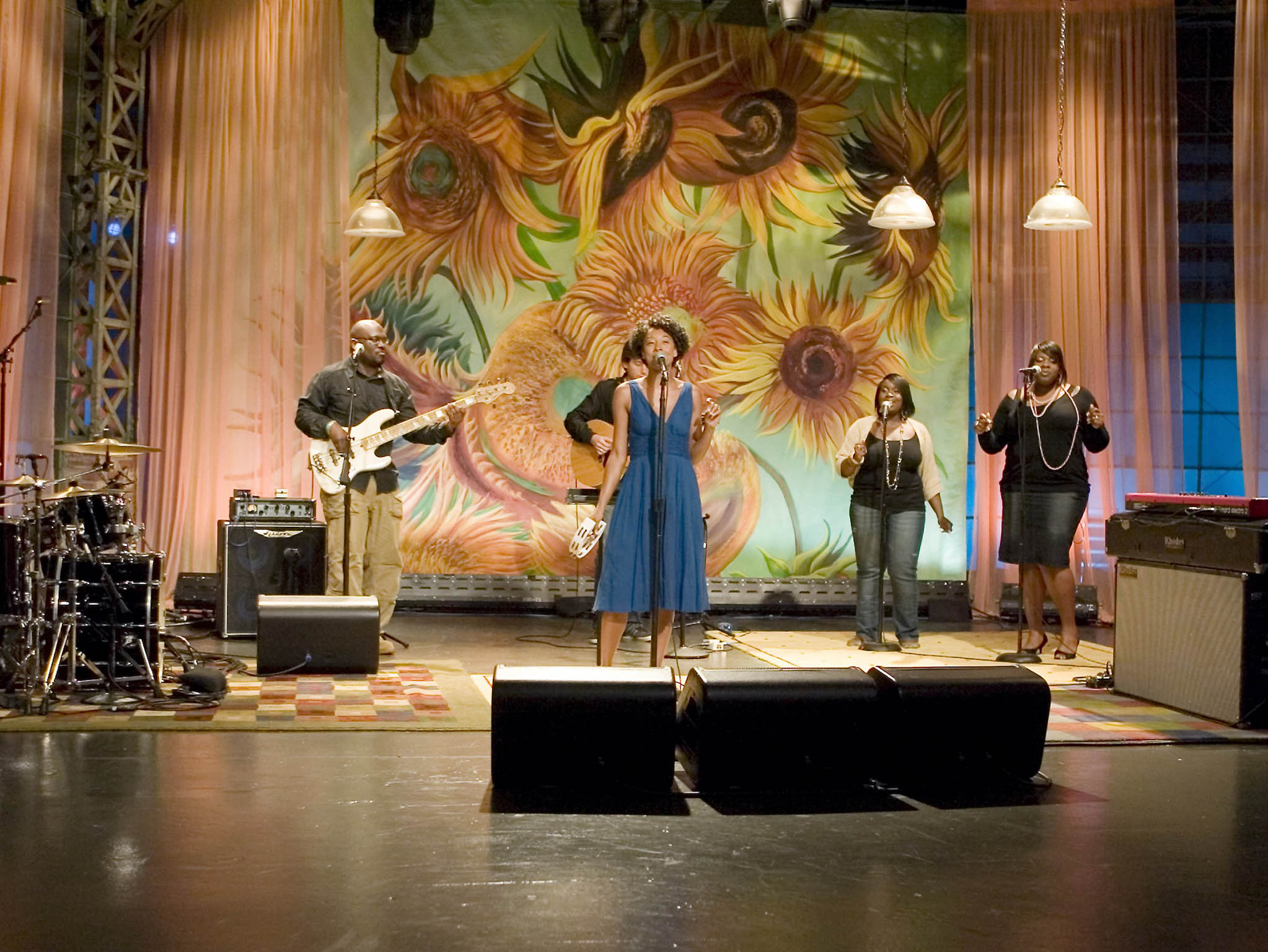Corinne Bailey Rae: The soul survivor on finishing her album after her husband died and finding love again
Corinne Bailey Rae was halfway through making her second album when her husband died. She tells Nick Duerden about the hardest year of her life and how she found her way back to music, happiness and love

There is a song that comes halfway through Corinne Bailey Rae’s new album, The Heart Speaks in Whispers, in which she ditches her doe-eyed jazzy songstress cloak in favour of channelling her inner Chris Martin.
It’s a delicate acoustic lament called “Stop Where You Are”, and it builds towards what can only be described as an anthemic, sing-along chorus.
“Stop where you are/ Under fading stars/ Light a fire where you are,” she sings, while her backing singers offer some undulating “woah-oh-ohs”. The goosebumps it prompts may be the result of shrewd sonic manipulation, but it is no less effective for it.
When I tell her this – intended as a compliment – on a bright February morning in a West London restaurant, she frowns.
“Coldplay? Really? I’m… I’m not really that aware of Coldplay songs,” she claims, a touch disingenuously given that she too lives on planet Earth.
But she is insistent. “I don’t know their music very well. With “Stop Where You Are”, I was just trying to write a song about being optimistic, really, about grabbing opportunity where it falls.”
New-found optimism is a theme that runs throughout an album that seems determinedly positive and meditative, even spiritual in places.
When it was announced that she was at last returning with only her third album in 10 years, it came with the following statement from the singer: “How does the heart speak to us? It speaks through Nature, Dreams, the Body and Instinct. These songs are mystical, elemental and concerned with transformation, verdant with lifeblood and cosmic nature.”
This rather made me fear that she would arrive today in long flowing robes and smelling of Body Shop product, issuing peace signs.
But no, she remains resolutely down-to-earth, and elegant in high fashion. Her new album is similarly tailored and upmarket, and, like everything she has ever done, is impeccably gentle and easy on the ear.
Any lyrical torment only becomes apparent through closer listening, and even when she sings, as her record-label boss puts it, “fuck” songs – with particular reference to the track “Green Aphrodisiac” – she does so in a manner that would raise the eyebrows of precisely nobody.
“I don’t ever feel in control of my songwriting,” she says. “They just sort of… happen. It’s like the fairytale of the shoemaker and the elves. He goes to bed at night, the elves get to work, and when he rises in the morning, all the shoes are there, made. It’s the same with my songs: they just appear.”

In truth, there are not many “fuck” songs on the new record. Many of the tracks, like “Caramel” and “The Skies Will Break”, instead concern the journey taken between darkness and light.
In 2008, her husband, saxophonist Jason Rae, died of a suspected drugs overdose. A medical report detailed traces of alcohol and methadone in his system, and the coroner delivered a verdict of death by misadventure. For Bailey Rae, halfway through completing her second album, everything fell apart.
She spent the most wretched year adjusting to widowhood before The Sea came out. When it did, she immediately went out on the road because, she says: “What else was I going to do? I was still very much in that phase. It hadn’t been that long since Jason died, and it was still my biggest preoccupation in life, a very real and present thing. Playing live with my band – my most trusted friends – seemed like the only thing to do.” And she enjoyed being on tour, she says. She travelled throughout America, and also in Brazil, Indonesia, and South Korea.
“It was great, and the shows themselves really helped focus my mind. But the promotion wasn’t much fun. The interviews I had to do… they were hard.”
Bailey Rae was then, and remains now, an intensely private individual. She makes for charming company, but her conversational comfort zone, among strangers at least, is music, and only that. Dare to stray, and she will guide you politely but firmly right back on topic.
Born in Leeds to an English mother and a father from St Kitts, she was a model student, and the very antithesis of a bad girl, a factor that perhaps contributed to the fact that her first band, Helen – inspired by the American all-girl rock group L7 – never fully convinced.
But being quieter than the average pop star didn’t hurt her career. She came of musical age in 2005, aged 26, alongside the likes of Amy Winehouse and Lily Allen, artists with whom she had little in common, and she stood out.
Her eponymous debut album, released in 2006, sold four million copies, and second album The Sea was a hit in America.
In 2012, her Is This Love EP won a Grammy for Best R&B Performance. She was already writing her third album by then, endlessly tinkering with songs in her home studio in Leeds with producer Steve Brown, a man she had known, and counted as a close friend, since 1997. In 2013, they married.
“It took me ages to even recognise that I was in love with Steve,” she confesses, shyly. “But then I’ve only ever been in love twice in my life, with him and Jason. Both times I didn’t recognise it as love, and both times they started out as friends. I just recognised it as an obsessive desire to spend a lot of time with the same person.”
Being married again clearly suits her. “If you have a time in your life where you weren’t happy, and in fact couldn’t imagine ever being happy again, then to rediscover it is incredible.”
When the album was finished, she says, she “felt relieved.” She then presented it to her American label boss, who liked it but also had reservations.
“He told me I needed to let the sunshine in, that it sounded like I had recorded it in a bubble” (the kind of bubble, perhaps, that kept her largely unaware of bands like Coldplay). “He was also very specific in his criticisms. He wanted to know why we had taken the drums out of the second verse of “Green Aphrodisiac”. ‘Don’t interrupt the rhythm!’ he told me.”
And so he invited her and Brown to Los Angeles, to work on it further. Over the next seven months there, they began to collaborate with other musicians – among them Valerie Simpson, and Marvin Gaye’s drummer James Gadson –and, in this way, gradually let the sunshine in.
“It’s a very seductive place, LA,” she says. “Initially, we had planned to only be there for a few weeks, but, you know, we had a house in the hills, a pool, a soft-top car, and then we got to play with all these incredible musicians, so there was little incentive to leave, really.”
Nevertheless, eventually they had to. Arriving back in Leeds, where there isn’t generally the climate for either a pool or a soft-top car, must have required certain adjustments.
She smiles tersely, as if reluctant to appear critical of her place of birth, and where much of her extended family still resides. “It did,” she says succinctly, and leaves it at that.
After years of emotional turmoil, Bailey Rae seems at last happy again. As our plates are cleared away, I ask if she and her husband are planning to have children. “That’s a little too private, really – considering I’m 36 years old,” she scolds.
And so we turn to other things. She tells me she has been reading a lot of Carl Jung lately, and is consumed by the idea that too many of us think with our brains when we should be listening closer to our hearts – and, apparently, our stomachs.
“Think about it! Why do we have that saying: go with your gut? It’s because there is also grey matter in our intestines!” (recent medical reports suggest there are more than 100 million brain cells in the gut).
“We know a lot of things instinctively, but we end up overthinking. It’s good to know I’m not just a brain in a jar!”
Recently, she was talking to a film composer who had spent seven years obsessing over a single project. “He told me how immersive it was, and how long you could find yourself on just one thing. And then he realised that he was going to die!” She laughs loudly.
“I really related to that because, you know, one day we are going to die! You can be completely consumed by a project, you want every last detail to be perfect, but you have to remind yourself that you are going to die.”
And what did she glean from this particular revelation?
“That we’ve all got to get out there and live more,” she says.
‘The Heart Speaks in Whispers’ by Corinne Bailey Rae is released on 6 May. The single ‘Been to the Moon’ is out now
Join our commenting forum
Join thought-provoking conversations, follow other Independent readers and see their replies
Comments
Bookmark popover
Removed from bookmarks